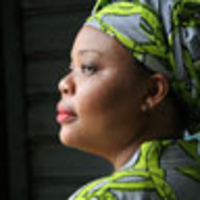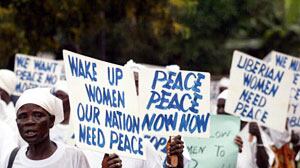
I’m so tired of seeing photographs of depressed-looking African women with sagging breasts. I know from experience that African women can be absolute hell-raisers. We have no other choice.
“Sex Strike” is the headline that sells, so when reporters interview me, they tend to ask about the sex strike first. Did the women of Liberia really bring an end to the heinous civil war by withholding sex? Well, it certainly gave the men a fresh motive to press for peace.
We must shame the mothers of the marauders into shaming their sons, into demanding an end to the marauding, an end to the rape, and an end to the atrocities.
But the truth is that the greatest weapons of the Liberian women’s movement were moral clarity, persistence, and patience. Nothing happened overnight. In fact it took three years of community awareness, sit-ins, and nonviolent demonstrations staged by ordinary “market women”—years of gathering in the roads in eye-catching white T-shirts, demanding the attention of convoys of officials and media folks who would glimpse the signs and the dancing, would hear the chanting and the singing.
Then we launched the sex strike. In 2002, Liberia’s Christian and Muslim women banded together to refuse sex with their husbands until the violence and civil strife ended.
• Support Leymah's group, the Women in Peace and Security Network Africa • Watch Leymah in Pray the Devil Back to Hell So my answer to the next question that reporters tend to ask me—whether what we achieved in Liberia can be replicated in other parts of Africa—is that it’s already happening. It happened in 2007 in Sierra Leone, when the women there demanded and achieved elections unmarred by violence. It’s happening now in Zimbabwe through Women of Zimbabwe Arise, whose leaders have overcome hunger and oppression and frequently end up in jail, but continue their calls for political reform. When Jestina Mukoko, a Zimbabwean peace activist, was arrested in 2008, some Zimbabwean sisters got the judge’s cellphone number and each sent him five text messages every day. The judge eventually had to change his number. A female supreme court judge threw the case out, and Jestina is now free.
It’s happening across the continent and on the Internet through organizations like the African Women’s Development Fund, the African Feminist Forum, the Women Peace and Security Network Africa, and the Web site Peace Is Loud. Women are mobilizing across ethnic lines and across national borders.
What we did in Liberia was to create havoc: peaceful, feminine havoc. The violent sociopath Charles Taylor is now in exile, and Ellen Johnson Sirleaf leads the country. And while Liberia is still enmeshed in post-conflict strife—there have been riots in just the past few weeks—it is no longer a bloody battlefield dominated by a kind of collective insanity. Women brought sanity to Liberia.
The next stage is the Democratic Republic of Congo. Women must create havoc there, where a sexual massacre has claimed more than 3,500 victims since the beginning of 2009. Over the last decade, hundreds of thousands of women and girls have been violently raped.
It’s up to women to nurture and heal their brutalized sisters and daughters, to bring them out of the shadows and to present the evidence of systematic rape before the citizens of Kinshasa, who harbor the illusion that the atrocities in another jurisdiction aren’t their responsibility. We must escort the victims to the villages in Burundi and Rwanda where the militia-rapists come from, and we must demand town meetings where the women in these villages are made to hear from the victims, made to hear what their sons are doing to the innocent women and girls of the DRC. We must shame the mothers of the marauders into shaming their sons, into demanding an end to the marauding, an end to the rape, and an end to the atrocities.
There will be meaning—and power—if the women of Africa converge on Congo and stand behind those who give testament to rape as a weapon of war.

Already, this very spring, across Congo, there are screenings of Pray the Devil Back to Hell, the acclaimed documentary about how my Liberian sisters and I brought peace to our country. That’s a start. But the people of the Democratic Republic of Congo need us sisters to actually show up on their turf, to stand with those who give testament, and to unite behind them.
We have a saying: “A single straw of a broom can be broken easily, but the straws together are not easily broken.” So here are three things African women can do to support their sisters and daughters:
1. Join the support network even if your own community is not plagued with conflict or violence. Most women only take action when their own communities are threatened. This must stop if we are to tackle the ills that are plaguing our African society. We must ignite the spirit of “Ubuntu”—“I am what I am because of who we all are.”
2. Develop a solid and consistent leadership base. The leadership of most African women’s initiatives functions very well during times of crisis, but tends to disintegrate after a huge success is scored. Movement leaders, even myself, made our own plans for self-advancement. It is time that the leadership of African women’s initiatives plans for succession.
3. Reach out to the un-converted. My final point comes from my 12-year-old daughter. For her, the feminist message is not filtering very well to potential victims, perpetrators, and government leaders. She believes—and I agree—that we speak loudest at women’s conferences and other spaces already filled with the converted. But we must speak to everyone, everywhere, about the struggles of African women.
We are all responsible. We are all complicit. White T-shirts catch the light. What matters is what we then do with that light.
GET INVOLVED: You can support Leymah Gbowee's work through the Women in Peace and Security Network Africa, and watch her in action in the riveting cult documentary by Gini Reticker and Abigail Disney, Pray the Devil Back to Hell.
The Liberian peace and women’s rights activist Leymah Gbowee is The Daily Beast’s Africa columnist. As war ravaged Liberia, Leymah Gbowee realized it is women who bear the greatest burden in prolonged conflicts. She began organizing Christian and Muslim women to demonstrate together, founding Liberian Mass Action for Peace and launching protests and a sex strike. Gbowee’s work in helping to oust Charles Taylor was featured in the documentary Pray the Devil Back to Hell.






